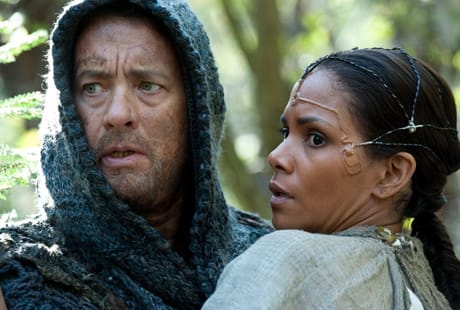Cracking David Mitchell's dense tome about how actions ripple through time to shape and affect souls for the screen must have been a daunting task, but the Wachowskis (The Matrix) and Tom Tykwer (Run Lola Run) do a masterful job of translating the ambitious text into a widely relatable epic.
Abandoning the novel's unique structure was a necessary conceit to the responsibility of engaging the fickle attention of a mass audience. For the most part, it works tremendously well, with the three directors adeptly juggling six interconnected plots taking place in different time periods and places around the globe.
A mid-19th century notary documents a perilous voyage across the Pacific; in 1931, a destitute young musician writes to his lover about his experiences as an amanuensis for a famed composer in Belgium; a reporter investigates a corporate conspiracy in '70s California; a present-day book publisher dodges Irish gangsters; a rebellious clone is interviewed before her execution in a dystopian future Korea; and a guilt-ridden tribesman in Hawaii wrestles with his inner darkness when confronted with a seed of hope presented by an outsider from a crumbled civilization.
These diverse stories are deftly connected by cyclical themes of oppression and resistance, love and sacrifice, courage and control. Existing in the visual medium of cinema forces the explicit interpretation of the evolutionary path each soul takes - it's one of a number of ways this adaptation spares the audience some intellectual strain - but it also gives the creative team room to expand upon gender themes and immerse the highly recognizable cast in a surprising number of roles.
The chameleon nature of the first-rate (though still sometimes distracting) practical effects encourages the actors to equally burry themselves in the colourful array of characters. Giving the performances some showiness reinforces the rather overt subtext that stories are embellished and distorted in the telling. That's how myths and legends are propagated, and that's how an elegant story packed with profound sentiments gets lured into a Hollywood ending.
It's a thematic compromise designed to mollify populist sensibilities, but a relatively minor one in the face of the broad-minded ideals championed and sheer exuberance of the film's cinematic craftsmanship.
The ensemble cast is uniformly strong (especially Tom Hanks and Jim Broadbent, but even Halle Berry rises to the occasion), the distinct art direction and special effects for each era are brilliantly executed, as are the required massive leaps in tone and style. And the music, that all-important Cloud Atlas Sextet hits all the right notes of emotional resonance, even if it's not as impossibly iconic as it wants to be, much like the film itself.
(Warner)Abandoning the novel's unique structure was a necessary conceit to the responsibility of engaging the fickle attention of a mass audience. For the most part, it works tremendously well, with the three directors adeptly juggling six interconnected plots taking place in different time periods and places around the globe.
A mid-19th century notary documents a perilous voyage across the Pacific; in 1931, a destitute young musician writes to his lover about his experiences as an amanuensis for a famed composer in Belgium; a reporter investigates a corporate conspiracy in '70s California; a present-day book publisher dodges Irish gangsters; a rebellious clone is interviewed before her execution in a dystopian future Korea; and a guilt-ridden tribesman in Hawaii wrestles with his inner darkness when confronted with a seed of hope presented by an outsider from a crumbled civilization.
These diverse stories are deftly connected by cyclical themes of oppression and resistance, love and sacrifice, courage and control. Existing in the visual medium of cinema forces the explicit interpretation of the evolutionary path each soul takes - it's one of a number of ways this adaptation spares the audience some intellectual strain - but it also gives the creative team room to expand upon gender themes and immerse the highly recognizable cast in a surprising number of roles.
The chameleon nature of the first-rate (though still sometimes distracting) practical effects encourages the actors to equally burry themselves in the colourful array of characters. Giving the performances some showiness reinforces the rather overt subtext that stories are embellished and distorted in the telling. That's how myths and legends are propagated, and that's how an elegant story packed with profound sentiments gets lured into a Hollywood ending.
It's a thematic compromise designed to mollify populist sensibilities, but a relatively minor one in the face of the broad-minded ideals championed and sheer exuberance of the film's cinematic craftsmanship.
The ensemble cast is uniformly strong (especially Tom Hanks and Jim Broadbent, but even Halle Berry rises to the occasion), the distinct art direction and special effects for each era are brilliantly executed, as are the required massive leaps in tone and style. And the music, that all-important Cloud Atlas Sextet hits all the right notes of emotional resonance, even if it's not as impossibly iconic as it wants to be, much like the film itself.
